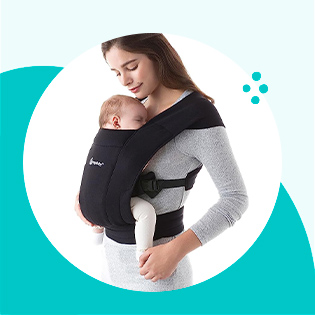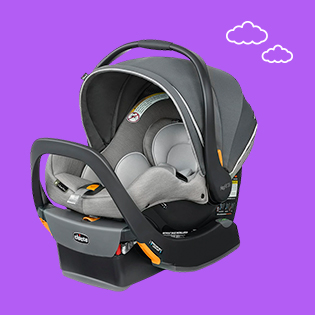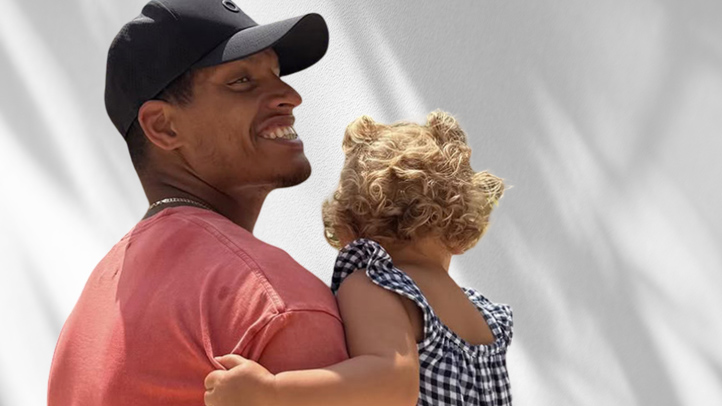Isaac Rochell thought he was ready for the birth of his daughter, Scottie. And then she was born.
“Once we actually had Scottie, I realized how challenging it was,” the former NFL defensive end tells What to Expect. “And really how much sacrifice it requires.”
He describes it as feeling like “there’s no light at the end of the tunnel.” “There's not going to be a random morning where you're like, ‘Oh, I get to sleep in and don't have to worry about this,’” he says. “That was the thing that kind of hit me and I'm like, ‘Wow, this is, this is real.’”
Rochell prides himself on taking the lead on middle-of-the-night diaper duty and washing pump parts — ”For literally 10 months, my wife never had to wash a pump,” he says. It wasn’t just to benefit Scottie, either. Rochell says he also wanted to take great care of his wife, Allison Kucharczyk, during the throes of the postpartum period.
“Look, I'll be the bad guy — if a dad is saying there's nothing he can do, he's being lazy,” he says. “There's no way for me to fully understand the extent of postpartum. So I think for me it was just trying to be there as much as possible, understanding that there is quite literally a massive chemical change that's happening in her body every day.”
Support from a partner isn’t just a nice-to-have during the postpartum period — it can literally be the difference between life and death: The first year after birth is a particularly vulnerable time for moms, who are at risk for complications like infection, hemorrhage and postpartum depression. Nearly two in three maternal deaths occur in the first year after birth — but most pregnancy-related deaths are preventable, according to the U.S. Centers for Disease Control and Prevention (CDC).[1]
Read More
A big player in protecting mom during the postpartum period? Dad.
In fact, evidence suggests that moms who have more involved partners tend to have better maternal health outcomes.[2] (It’s why our nonprofit arm, the What to Expect Project, advocates for the Dads Matter Act.)
Even if mom is breastfeeding, rest assured that there’s plenty you can do to make her life during postpartum easier and healthier. “I don't think there's a one-size-fits-all to every parenting situation,” Rochell says. “[But] there are a million other things that can take the mental and physical load off the mom.”
Here are a few ideas for how you can better support your partner.
1. Know how to contact your partner’s doctor — especially in an emergency
With all the physical changes that happen during postpartum, it’s tough for a new mom to know her baseline of what is normal. Dads can help by watching for the symptoms that act as warning signs for serious postpartum conditions, then contacting the doctor.
“Dads should [also] always be on alert for postpartum mood changes,” says Toni McDougald, MSN, WHNP-BC, coordinator of Cleveland Clinic’s CenteringPregnancy care group. “Some can be normal, and it doesn’t mean there’s anything wrong. But we want them to be on alert if things progress or aren’t getting better.”
If your partner is experiencing any symptoms of a serious medical problem, such as the ones below, call a doctor or go to the emergency room right away:[3]
A headache that won’t go away or keeps getting worse
Dizziness or fainting
Severe nausea and vomiting
Severe abdominal pain that doesn’t go away
Trouble breathing
Vision changes
A fever of 100.4 degrees F or higher
Severe swelling, redness, or pain in the leg or arm
Extreme swelling of the hands and face
Thoughts of harming yourself or your baby
Chest pain or a rapid heartbeat
Heavy vaginal bleeding or discharge
Mental health concerns can also creep up quickly. Dads should look out for symptoms of a perinatal mood disorder in their partner. These symptoms commonly include:
Persistent feelings of sadness, hopelessness or helplessness
Severe anxiety
Loss of interest in activities she used to enjoy
Social isolation — feeling withdrawn or unconnected
Feelings of worthlessness and of being a bad mother
Inability to care for yourself or your baby
Worrying excessively about your baby’s health
Having scary or obsessive thoughts about your baby
Having negative feelings toward or little interest in your baby
Fear of being alone with your baby
If she has to go to the doctor’s office or the hospital, make the calls to arrange for child care and go with her. Then make sure she gets the treatment she needs to feel better.
2. Help with the healing
Recovering from delivery takes time. “Partners can help by talking with the medical team about what to expect and what to look out for when mom leaves the hospital,” says Nicole Taylor, M.D., PMH-C, a member of the medical review board of What to Expect. “Make sure to ask questions about any medications or supplies that Mom might need in her recovery.”
Some of those supplies likely include pain medications, sanitary pads and ice packs.[4] Make sure she has her medication and water reachable from bed (if she had a C-section, simply getting out of bed can be hard for the first week or so). And keep an inventory of what’s in the bathroom — buy more if you’re running low.
If she’s had a C-section, she may also need some help with wound care, says McDougald. You may need to help her keep the wound area clean with mild soap and water and be on the lookout for signs of an infection, including redness or discharge, which warrants a call to her doctor.[5]
3. Help with feedings
If Mom is nursing, she may need your help lifting the baby out of the crib and into her lap. This is especially true for moms who’ve undergone C-sections, since they won’t be able to lift anything for a few weeks.
“I got up every single [night feed],” Rochell shares. “We had a flow where I would get up, change the diaper, bring Scottie back and [Allison] would breastfeed. I was able to be present with her in the middle of the night.”
If she isn’t nursing, you can help out by giving your baby a bottle. Remember: If she’s pumping, each session can take 30 minutes from start to finish and giving a baby a bottle while pumping is pretty hard to juggle, so you’ll save her some time by tackling bottle duties yourself.
If she’s still adjusting to breastfeeding and meeting with a lactation consultant, go with her or stay on the call. “Sometimes the partners remember something that the mom didn’t,” says McDougald.
And helping with cleanup is just as important as helping with feeding. “My wife exclusively pumped for 10 months and never washed a pump,” he says. “I can’t pump, obviously, but I washed it every single time.”
4. Grab her a snack and some water
Breastfeeding and pumping require a lot of calories and a lot of fluids. So grab her a glass of water or a protein bar. She needs to keep her energy levels up, but she may be so focused on the baby right now that she’s forgetting about herself.
“Some women keep a cart with snacks next to their chairs,” says McDougald, so make sure it’s stocked with healthy food and drinks. Once she sits down to feed, it won’t be easy for her to get up and grab something she forgot.
5. Learn to soothe the baby
If there’s one thing babies do well, it’s cry. And even though that’s a good thing (they need to communicate somehow, after all), it’s hard to appreciate that fact when you’re an hour into a colic episode. A little soothing on your part can go a long way, though.
While you may do things differently than mom does, that’s okay, explains McDougald.
“Use techniques like walking with the baby and making shushing sounds,” she says. Your baby may be used to Mom’s calming style, but she will learn to love your soothing ways too.
6. Change the diapers (even the middle-of-the-night ones)
“I’m a firm believer that the easiest thing a dad can do is change every single diaper,” says Rochell. Even if she’s breastfeeding and doesn’t “need” you for 3 a.m. feedings, be there anyway for the diaper change as much as you can.
Look at it this way, he says: “It takes you two minutes to change the diaper and you’re done.” Besides, those middle-of-the-night cuddles are prime bonding time for all of you. Don’t miss them.
7. Encourage her to take a nap
Even if you’re tired during the day, let her nap while you take over baby duty. Sure, you both need to catch up on your sleep, but remember that she’s also recovering physically from childbirth (and if she’s nursing, expending plenty of energy making milk).
“My wife is a warrior — all moms are,” Rochell says. “In my life, I have not seen a person as passionate about anything as she was about pumping and doing everything for our daughter … Putting her body through everything to help create and sustain the life of her child, and that requires a lot on the body and mind.”
8. Take over the bulk of the household chores
“For the first three weeks, we encourage [dads and partners] to take the role in household chores,” says MacDougald. If you have family who can help out, or you can score some paid or volunteer domestic help that lets you both focus your energy and attention on the new baby and each other, go for it.
If guests come by to see the baby, make sure they don't overstay their welcome and that you're the one offering up beverages and snacks and cleaning up in their wake.
9. Have a positive attitude
There’s no getting around it: The first few months of your baby’s life are tough. But your positive outlook will go a long way in helping Mom keep up her sleep-deprived spirits.
New moms “don’t have the opportunity to leave the house and do a bunch of stuff,” says Rochell. “So the least the dad could do is be positive.”
Rochell likens the experience to moving to a new state where his wife didn’t know anyone after he was traded to a new team in the National Football League. “If I came home and I was positive, the house was positive,” he says. “If I came home and I was negative, the house was negative.”
He adds that even when the experience of caring for his baby and wife felt really hard on him in the first year, he tried to keep empathy front and center.
“I cannot imagine having to build a child, have a child — it just seems so challenging,” he says.
Resources for dads
Don’t overlook your own mental health when prioritizing the well-being of your baby and your partner. Dads can also get postpartum depression — estimates vary, but one widely cited study puts its prevalence in fathers at 1 in 10. If you suspect you have PPD, talk to your partner or a trusted friend or family member about it. Don't hesitate to seek professional treatment — for the health and wellness of both you and your baby. Here are a few resources to look into:
Postpartum Support International: a nonprofit dedicated to helping families who are struggling with mental health conditions, including during the postpartum period.
DADvocacy Consulting Group: a nonprofit that helps fathers flourish as parents.
Welcome to Fatherhood: a video course that guides fathers through pregnancy, childbirth and postpartum; there are also coaching sessions available.
Whatever you do, don't worry that you're not qualified for the job — no one's born knowing how to swaddle or burp a baby. All new parents learn on the job — one sleepless night, one dirty diaper at a time. And as hard as fatherhood can be, it’s also incredibly rewarding.
“Having a kid has been the most beautiful thing that I’ve ever done in my life,” says Rochell. “Like, by a long shot. I had a great NFL career, went to Notre Dame and have done a lot of cool things. But getting married and having a kid is that, times ten.”
Join What to Expect on July 23 for #BumpDay to show your support for pregnancy and postpartum care that supports every mom, everywhere. Post a baby bump pic — yours or one you love, past or present — or simply share a message of solidarity with the hashtag #BumpDay.





























































































